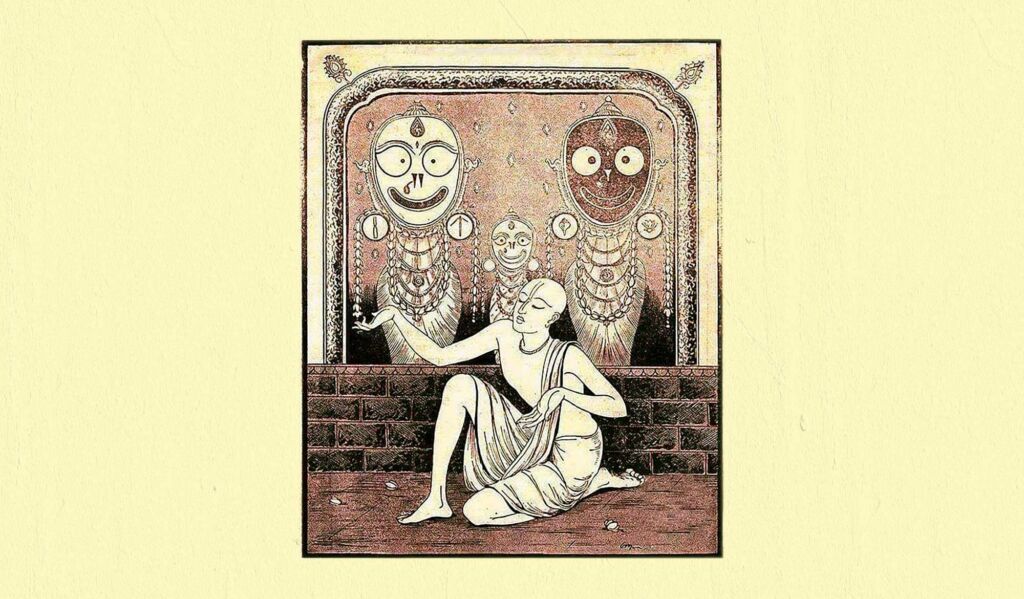Śrī Śīkṣāṣṭakam Verse Seven
With the Sammodana Bhāṣyam by Śrīla Bhaktivinoda Ṭhākura
(translated by Swami B.V. Giri)
VERSE 7
yugāyitaṁ nimeṣeṇa cakṣuṣā prāvṛṣāyitam
śūnyāyitaṁ jagat sarvaṁ govinda-viraheṇa me
O Govinda! Not seeing You, a moment feels like many yugas. Tears fall from my eyes like torrents of rain and the entire world almost feels empty.
At the stage of prema, that bhakti in the form of rati, which is replete with sthāyi-bhāva (permanent bhāva), becomes bhakti-rasa when it is connected with vibhāva (voluntary symptoms of bhāva), anubhāvas (involuntary symptoms of bhāva), sāttvika-bhāvas (ecstatic symptoms) and vyabhicārī–bhāvas (transitory bhāva). In that stage, all these anubhāvas and sāttvika–bhāvas are seen altogether in their complete forms.
samyaṅ masṛṇita-svānto mamatvātiśayāṅkitaḥ
bhāva sa eva sāndrātmā budhaiḥ premā nigadyat
“When the state of bhāva becomes intense, it completely softens the heart and a feeling of great possessiveness towards the Lord arises. This is described as prema by the wise.” (Bhakti-rasāmṛta-sindhu 1.4.1)
By this conclusive statement, it is understood that prema is bhakti with deep bhāva stemming from a mood of great possessiveness towards Śrī Kṛṣṇa. In this regard, there are the various primary relationships of the āśraya (the shelter, or possessor of love) and the viṣaya (the object, or the recipient of love) within bhakti–rasa, namely śānta, dāsya, sakhya, vāstsalya and madhura. There are also various secondary relationships:
hāsyo’dbhutas tathā vīraḥ karuṇo raudra ity api
bhayānakaḥ sa-bībhatsa iti gauṇaś ca saptadhā
“Humour, amazement, chivalry, compassion, anger, fear and disgust – these are the seven secondary rasas.” (Bhakti-rasāmṛta-sindhu 2.5.116)
Amongst the primary rasas, madhura-rasa is most superior. Sequentially, these primary rasas become imbued with prema, praṇaya (deep affection), māna (pride), sneha (affection), rāga (attachment), anurāga (deep attachment) and mahā–bhāva (supreme ecstasy).
tatrollāsa-mātrādhikya-vyañjikā prītiḥ ratiḥ śānta-rase’numīyate yasyāṁ jātāyāmanyatra tucchatva buddhiś ca jāyate
Where prīti only manifests due to an extreme feeling of jubilation, then that rati is taken to be śānta-rasa, and when that arises, anything else that appears is considered to be insignificant.
mamatātiśayāvirbhāvena samṛddhā prītiḥ premā dāsya-rase lakṣyate. yasmin jāte tat-prīti-bhaṅga-hetavo na prabhavasti.
The increase of prīti with extreme possessiveness becomes that prema which is observed within dāsya–rasa. When it arises, that prīti will not accept any cause for disruption.
visrambhātiśayātmakaḥ premā praṇayaḥ, yasmin jāte sambhramādi-yogyatāyām api tad-abhāvaḥ.
Prema imbued with intimacy becomes praṇaya which is accepted as sakhya–rasa. When this manifests, reverence etc. is completely absent.
priyatvātiśayābhimānena kauṭilyābhāsa-pūrvaka-bhāva-vaicitrīṁ dadhat praṇayo mānaḥ. yasmin jāte śrī-bhagavān api tat-praṇaya-kopāt prema-mayaṁ bhayaṁ bhajate.
When one identifies oneself as being most dear to Kṛṣṇa which causes a pretence of crookedness and a variety of moods to manifest, then that praṇaya is māna. When it arises and His lovers quarrel with Him, even Śrī Bhagavān feels fear filled with prema.
ceto-dravātiśayātmakaḥ premaiva snehaḥ, yasmin jāte mahā-bāṣpādi-vikāraḥ darśanāatṛptis tasya parama-sāmarthyādau saty api keṣāṁcid aniṣṭāśaṅkā ca jāyate.
Prema, where the heart melts to a great extent, is sneha. When this arises, there are transformations such as the profuse shedding of tears etc., one is dissatisfied even by seeing the Lord, and even though He is supremely capable, unnecessary fear for Him arises within some people.
These two characteristics are seen within vātsalya-rasa.
sneha evābhilāṣātiśātmako rāgaḥ, yasmin jāte kṣaṇikasyāpi virahasyātyantaivāsahiṣṇutā. tat-saṁyoge paraṁ duḥkham api sukhatvena bhāti, tad-viyoge tad-viparītam.
Sneha, when it becomes full of desire, is rāga. When it appears, then one cannot tolerate even a moment of separation. Upon meeting the Lord, the greatest misery becomes happiness. It is the opposite in separation.
sa eva rāgo’nukṣaṇaṁ sva-viṣayaṁ nava-navatvenānubhāvayan svayaṁ ca nava-navībhavann anurāgaḥ, yasmin jāte paraspara-vaśībhāvātiśayaḥ. prema-vaicittyaṁ tat-sambandhiny aprāṇiny api janma-lālasā, vipralambhe visphūrtiś ca jāyate.
That rāga which causes its object of affection to be experienced at every moment as ever new is anurāga, which itself becomes ever-fresh. When it appears, both lovers are completely controlled by one another, they experience prema-vaicittya (bewilderment due to prema), and a hankering arises within them to be born as inanimate objects connected to their lover. This gives rise to vipralambhe visphūrti (out of separation, one sees their beloved everywhere).
anurāga evāsamordhva-camatkāreṇonmādako mahā-bhāvaḥ. yasmin jāte yoge nimeṣāsahatā kalpa-kṣaṇatvam ity ādikam. viyoge kṣaṇa-kalpatvam ity ādikam. ubhayatra mahoddīptāśeṣa-sāttvika-vikārādikaṁ jāyate.
When anurāga becomes madness with unparalleled astonishment, then that is mahā–bhāva. When this arises, upon meeting one’s lover, even blinking one’s eye for a moment is intolerable and a kalpa only seems like a moment. In separation, even a moment seems to be a kalpa. Here, the sāttvika transformations occur with unlimited and extreme intensity.
Thus, with the aid of statements from the Prīti Sandarbha, a summary of all the bhāvas, and specifically the transformations within the ujjvala-rasa, have been shown here within the teachings of Śrīman Mahāprabhu.
The section, yugāyitam etc. is obvious. The phrase govinda-virahena is understood to be vipralambhā (separation).
sa pūrva-rāgo mānaś ca pravāsādi-mayas tathā
vipralambho bahu-vidho vidvadbhir iha kathyate
“Those who are wise have described many kinds of separation such as pūrva-rāga, māna and pravāsa.” (Bhakti-rasāmṛta-sindhu 3.5.25)









